Reviews
Richard Kelly
USA, 2006
Credits
Review by Budd Wilkins
Posted on 27 August 2013
Source Sony Pictures BRD
Related articles
Reviews
Southland Tales by Victoria
Categories Favorites: The Apocalypse
“Ladies and gentlemen,” an unctuous announcer intones late in Richard Kelly’s gonzo sci-fi satire, “the party is over. Have a nice apocalypse.” That sentiment accurately encapsulates Kelly’s snarky approach throughout, an indication that his comedic sensibility is more likely to provoke a smirk than a guffaw, the sort of mixed-signals message that carries through to Kelly’s idea of stunt casting comedy actors in mostly straightforward dramatic roles. Jonathan Swift, one of satire’s ablest practitioners, famously equated it with “savage indignation,” and the same sense of outrage clearly fuels Southland Tales. Only the film’s targets are so diverse and diffuse that - despite the impression of a wholesale demolition of false idols - none of them wind up receiving any more than the equivalent of a swift kick in the shin. Precisely this surfeit of satirical straw men contributes to the fact that the film feels at times both overstuffed and undernourished, an impression only exacerbated by Southland Tales’ labyrinthine backstory and history of editorial tinkering.
When it comes to the overarching meaning of any film, viewers only have the film to judge by. So whatever contribution to the clarification of Southland Tales’ enigmatic lacunae would have been provided by a longer cut of the film, or by referring to the trilogy of prequel graphic novels published in the wake of its disastrous Cannes premiere, has to be discounted when considering the film per se. Believe it or not, that policy ends up working in Richard Kelly’s favor. As with his previous film Donnie Darko, whose Director’s Cut tended to dissipate the truncated version’s delicately balanced atmosphere of mystery by tying things up in too neat and logical a ribbon of explanation, less is more when it comes to Southland Tales. Consider Richard Kelly the Accidental Surrealist, forced by the caprices of production to cultivate an aura of inscrutability.
Kelly weaves a dense postmodern skein into Southland Tales, providing a superabundance of referents that contribute to what Freud would have called the overdetermination of the film’s meaning: a perversely polymorphous or polysemic quality. Quotes drawn from the poems of T.S. Eliot and Robert Frost are fairly obvious to those who have ears to hear, as are Pilot Abilene’s numerous cribs from the Book of Revelation. Clips from Robert Aldrich’s brutal noir deconstruction Kiss Me Deadly play on televisions glimpsed rather conspicuously in the background of several scenes, including one that takes place on the Baron’s MegaZeppelin not long before the film’s sardonically apocalyptic finale. This is especially apt since Aldrich’s film also contains a Pandora’s Box whose opening leads to an incendiary conclusion.
Indeed, the mushroom cloud that ends Kiss Me Deadly finds its resonant echo in the one that blossoms over Abilene, Texas, in Southland Tales’ expository prologue. Tracing out the film-historical through line here leads us, interestingly enough, to Alex Cox’s Repo Man. Consider this: Both films feature an eerily radiant vehicle ascending abruptly into the Los Angeles night sky. Cox’s film explicitly plays on the tropes and visuals of Kiss Me Deadly, albeit in a far less literal fashion than Southland Tales. What undergirds all three of these films is not only a sense of dissatisfaction with prevailing social and political norms, but also an impatience with (and even a sense of disdain for) the conventions by which the popular culture depicts and thus maintains the status quo.
The final strand in Southland Tales’ byzantine intertextual web binds it indissolubly to the work of Philip K. Dick. Dick’s novel Flow My Tears, the Policeman Said is directly referenced in the moment where UPU2 policeman Bart Bookman invokes Dowson’s poem “Flow My Tears,” from which Dick took his title, right after murdering two unarmed civilians. What’s more, the titular cop in the book is named Felix Buchman, not exactly a far cry from Bookman. The plot of “Flow My Tears” concerns a world-famous TV host named Jason Taverner who wakes up one morning to discover that no one remembers him or his television show. The explanation for this mystery involves identity crises, alternate realities and dimensional rifts: three elements found in abundance throughout Southland Tales. In the film, the similarly named Ronald/Roland Taverner has traveled through one of these temporal rifts, effectively duplicating himself in the process. Last and certainly not least, the oracular character of Simon Theory has been made up so as to bear an uncanny resemblance to Philip K. Dick himself.
Gazing up from the troughs of the mid-Bush years, Kelly expediently scheduled his then-future shocks for the next election year, so it seems evident he had some idea of effecting real-world change with his satirical screed. Precisely in what fashion isn’t quite so easy to discern. The film’s resident porn actress/talk-show host Krysta Now may indeed “rock the cock,” as several of the characters maintain, but it’s still unclear how Southland Tales was ever going to work as an extended Rock the Vote ad. Conversely, Southland Tales does retain its aura of uncanny resonance. Recent revelations about the scope of the NSA’s surveillance network, for example, make the film’s USIDent agency look like rank amateurs. Perhaps unsurprisingly, regime change has not blunted the film’s equal-opportunity ridicule. In the immortal words of our contemporary philosopher Peter Townshend: “Meet the new boss, same as the old boss.” It’s an ironic takeaway for an apocalyptic political satire with aspirations that include prophecy.
More Favorites: The Apocalypse
-
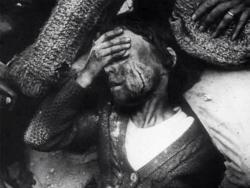
The War Game
1965 -

On The Beach
1959 -
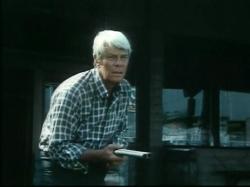
Where Have All the People Gone
1974 -

A Boy and His Dog
1975 -
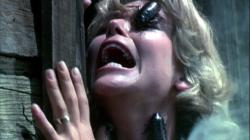
Bug
1975 -
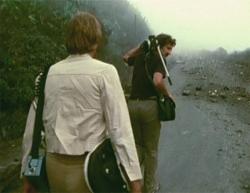
La Soufrière
1977 -

Escape from New York
1981 -

The Road Warrior
1981 -

Le Dernier Combat
1983 -

Night of the Comet
1984 -

Threads
1984 -

The Terminator
1984 -

Def-Con 4
1984 -
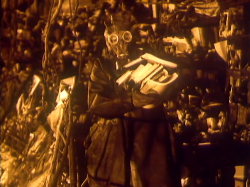
Letters From a Dead Man
1986 -
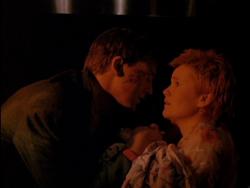
Miracle Mile
1988 -

Last Night
1988 -

Last Days
2005 -

The Rapture
1991 -

Southland Tales
2006 -

Idiocracy
2006 -

The Happening
2008 -

The Road
2009 -

Cosmopolis
2012
We don’t do comments anymore, but you may contact us here or find us on Twitter or Facebook.



